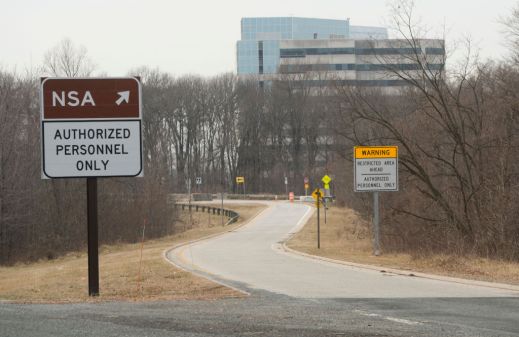Wondering what it’s like to work at the National Security Agency, one of the most secretive intelligence agencies in the world, is nothing new for most people. But wondering what it’s like in the aftermath of an unprecedented security breach that has fed a campaign to demonize the agency and its employees is an entirely different proposition. To understand that, you have to have lived it — you have to have had your patriotism and common decency challenged on the front page of nearly every dying newspaper in the world.
 Christina Achampong, an operations researcher at NSA, says “whatever happens in the world can be modeled as a math problem.”
Christina Achampong, an operations researcher at NSA, says “whatever happens in the world can be modeled as a math problem.”Christina Achampong knows what that’s like. The 30-year old operations researcher has applied her mathematics expertise at NSA since 2009. She describes her experience working at the agency as “wonderful.” But there was that one moment, shortly after former NSA contractor Edward Snowden disclosed thousands of classified documents detailing NSA’s operations around the world, when the mainstream media began painting the agency with the broad strokes of an evil empire bent on destroying liberty that Achampong and her colleagues felt the need to pause and think about what was being said about them.
“I did have that moment of ‘Is this true? Is this who we really are? Are we who they say we are?’” Achampong told FedScoop in an exclusive interview at NSA’s headquarters. “I think that everybody must have had that moment of introspection. I know that they must have had the same moment. You could feel it. I came to the understanding that the answer was a resounding no. No.”
There it was. Long before the newly-appointed NSA Director Adm. Michael Rogers had issued his current marching orders to stick to the facts and not apologize to anybody for being a part of NSA, Achampong and her colleagues had put the noise of Washington, D.C.’s media echo chamber behind them. “Surprisingly, it sort of cemented my resolve. We seemed to have doubled-down in our commitment and we’re all as passionate as ever,” she said. “It’s unfortunate, it’s hurtful, and it’s hard sometimes from day to day when it’s constantly something else and something else. But we all still come to work, and we all still do our job, and we’re not going anywhere.”
From puzzles to the puzzle palace
As a young girl, Achampong loved numbers, puzzles and problem solving. Her mother bought her math workbooks with stickers in the middle that she got to use as a reward for answering correctly. “While most parents would bring coloring books along to keep their kids quiet, my mom would bring those. And I would just sit wherever [we were] and do word problems for hours and be perfectly happy,” Achampong recalled. “That was always my thing. To this day, I still can’t color very well.”
Not surprisingly, math was her strength in high school. She scored 710 out of 800 on her math SAT, which sent her on her way to eventually earning a Bachelor of Science degree in mathematics from Drexel University. By 2009, Achampong had earned dual master’s degrees in industrial engineering and operations research at Pennsylvania State University.
She recalls attending a conference for operations research professionals shortly after graduation. To her surprise, the conference hosted a job fair. And there, at its own booth, was the NSA.
“I didn’t even have a resume on me,” she recalled. “I don’t think there’s anybody who is looking for a career in math that doesn’t come across NSA. Whatever you do in math, they do it here.”
 “I don’t think there’s anybody who is looking for a career in math that doesn’t come across NSA. Whatever you do in math, they do it here,” said Christina Achampong, an operations researcher at NSA.
“I don’t think there’s anybody who is looking for a career in math that doesn’t come across NSA. Whatever you do in math, they do it here,” said Christina Achampong, an operations researcher at NSA.What she didn’t know then, however, was NSA’s need for operations researchers — professionals who specialize in an advanced mathematics field that deals with optimal decision making. Achampong had found a home in an organization with the highest-concentration of mathematics experts in the world. She was a direct hire, which means she didn’t go through one of the agency’s development programs.
“I went directly into a full time organization where the entire mission of the organization was to do operations research work. Just about everybody there was an operations researcher or industrial engineer or mathematician,” she said.
Operations research at NSA
Operations researchers are employed in virtually all areas within NSA, but the largest pool of operations researchers sits in the Technology Directorate’s Systems Engineering division, working in teams of two or three. When asked to describe what type of mathematics operations researchers use, Achampong kindly tries to explain the advanced mathematical concepts in layman’s terms even a journalist can understand.
“We solve decision analysis problems for the NSA,” she said. “Operations research is specifically about optimal decisionmaking…optimal in the mathematical sense. There are several fundamental math disciplines that support operations research, namely linear algebra. What we do is take a problem as it’s expressed to us and mathematically model it. So, we translate the problem into math. Whatever happens in the world can be modeled as a math problem.”
But operations research is multidisciplinary — you might need to use simulation or mathematical modeling or statistical analysis, according to Achampong. “Some problems may require regression analysis, or linear programming or integer programming. For the most part in decision analysis I’ve dealt with weighted sums,” she said.
Technical recruiting & service
In addition to her work in operations research, Achampong also does technical recruiting for the agency. Put simply, she’s the recruiter who can tell the posers from the real experts. And when it comes to recruiting the world’s best talent, she has a simple message for them. “It doesn’t matter who you are or what you’ve done, you haven’t done this,” she said, referring to the challenging and rewarding work she does at NSA.
 “We protect this nation,” Achampong said, tears welling up in her eyes. “And I don’t know how much of what I say people will believe, but they can believe that.”
“We protect this nation,” Achampong said, tears welling up in her eyes. “And I don’t know how much of what I say people will believe, but they can believe that.”But the next generation of mathematical talent is also important, both to NSA and to Achampong personally. So she spends a lot of time volunteering throughout Baltimore County schools in Maryland co-teaching an Algebra II class.
So what do junior high school and college level students think about the NSA?
“In the classrooms…at the eighth grade level, they’re just still fascinated to know that everything their teacher has been teaching them all year is something real and is actually something you use,” Achampong said.
However from new college graduates, the majority of the questions she receives involve lifestyle issues. “At the collegiate level they want to know what is it like to not be able to carry your cell phone in the building? How has this impacted your social life? Is there flexible time? Do I have to work 8-to-5? Even [with the big issues facing the nation and the debate about NSA’s role and mission] those are the majority of the questions.”
The questions Achampong receives from college students researching their first career reflects more on the idiosyncrasies of a generation defined by the iPhone and social media than it does on work environment at NSA. “The work here is so rewarding. I’m sure that after a while [the mantra of we protect this nation] starts to sound like a talking point. But we protect this nation,” she said, tears welling up in her eyes. “And I don’t know how much of what I say people will believe, but they can believe that. I’m sorry,” Achampong said, pausing to regain her composure.
“To know that you get to work with people who are years ahead of their fields who will never be able to publish. The sacrifices that are made.” Follow @DanielVerton







